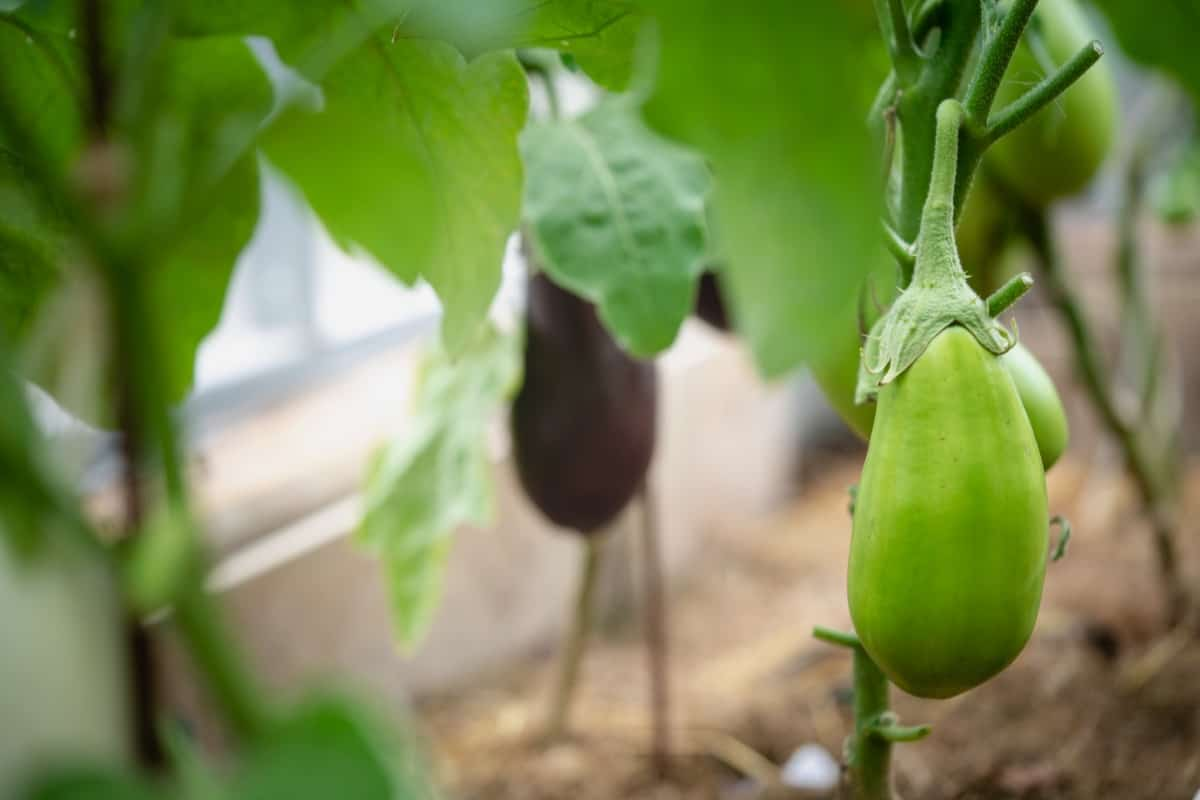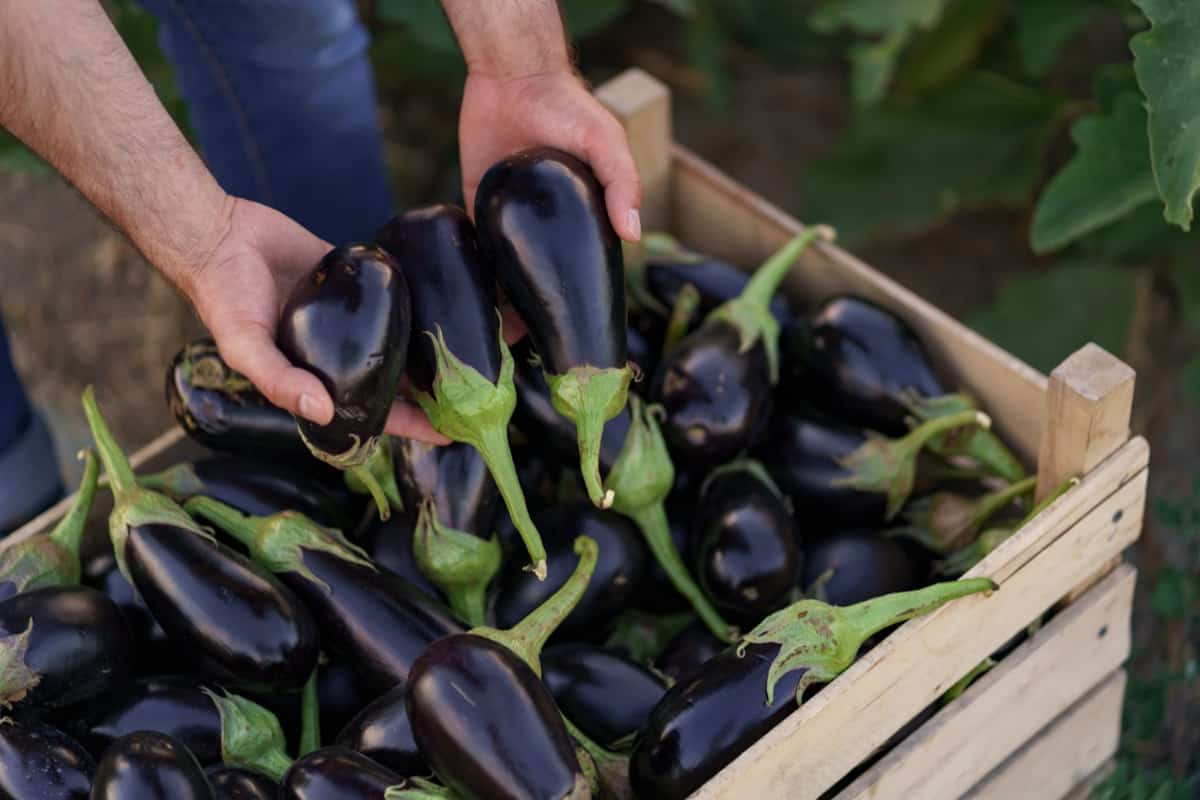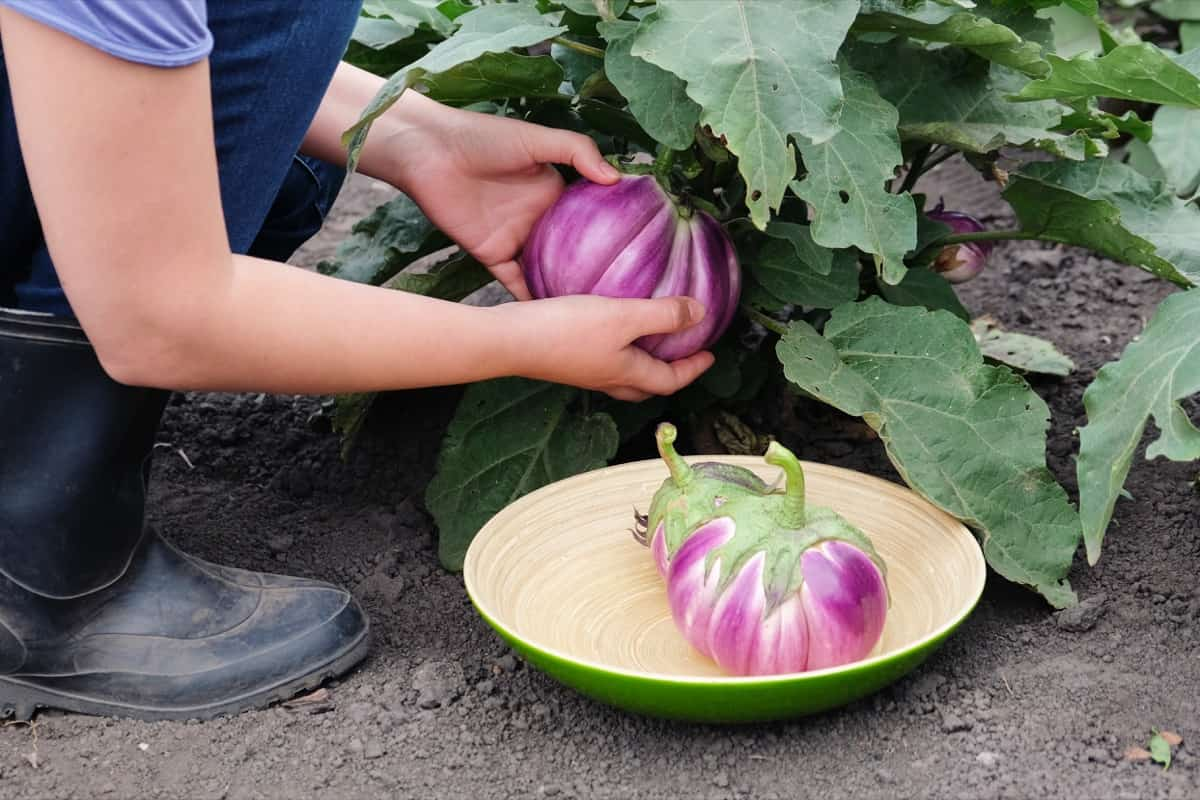There’s something remarkably rewarding about nurturing a seed into a sprouting plant and eventually harvesting the fruits of your labor. The eggplant is a favored selection among the many delightful choices for home gardeners, known for its succulent taste and versatile culinary applications. However, as with any gardening endeavor, growing eggplant plants has its trials and tribulations.

Unforeseen issues can emerge, affecting the health of your plants and reducing their yield. Understanding these problems is the key to rectifying them promptly, ensuring the successful cultivation of these nutritious nightshade fruits. Discover ten common issues that affect eggplant plants in gardens. Learn about the causes, treatment, and prevention methods to keep your garden flourishing.
10 Common Problems With Garden-Grown Eggplant Plants
Yellowing Leaves on Garden-grown Eggplant Plants
Firstly, let’s delve into a common occurrence that baffles many gardeners: yellowing leaves on eggplant plants. Yellow leaves might indicate several issues, most prominently overwatering. This is one of the leading signs of overwatering eggplants. When the plant gets too much water, it could lead to oxygen deficiency in the root system, causing leaves to turn yellow.
To avoid this issue, ensure your plants are watered consistently but not excessively, maintaining soil that’s moist but not waterlogged. Another possible cause of yellow leaves could be nitrogen deficiency. Nitrogen is crucial for plant growth; a deficiency can cause yellowing of leaves. A balanced, all-purpose fertilizer can help provide the necessary nutrients your plants require.
Wilting Eggplant Plants in the Garden
Secondly, we encounter the issue of wilting eggplant plants. One of the main culprits behind wilting is root rot, often due to overwatering or poor drainage. Overwatering suffocates the plant’s roots, leading to rot and consequent wilting. It’s essential to provide adequate drainage and water your plants judiciously to avoid such scenarios.
Another cause could be fungal infections. Many kinds of soil-borne fungi can lead to wilting. In such cases, using the best fungicide for eggplant becomes necessary. It is crucial to choose a product specifically targeting the fungus affecting your plants and apply it as per the instructions provided.
Pest Infestation on Eggplant Plants in the Garden
Thirdly, a commonly experienced issue is pest infestation on eggplant plants. Holes in eggplant fruit often indicate a pest problem, with culprits including caterpillars, beetles, and slugs. Implementing organic pest control methods like introducing beneficial insects (ladybugs, spiders, and birds) that prey on these pests can be effective. Additionally, using plant-friendly insecticides can also provide relief from pest infestations.
Stunted Growth in Garden-grown Eggplant Plants
Our fourth point of discussion involves stunted growth in eggplants. In many instances, inadequate sunlight or water could lead to slow or stunted growth. Eggplants thrive in sunlight and require 6 to 8 hours of direct sunlight every day for their best growth. Similarly, consistent watering is essential. Moreover, soil fertility can play a crucial role. A nutrient-rich soil fosters healthy growth. If you’re noticing stunted growth, consider performing a soil test to identify any deficiencies that can be corrected with the right type of fertilizer.
Fruit Dropping From Eggplant Plants in the Garden
Fruit drop is another problem gardeners might face. It’s disappointing when your plants seem healthy, but the fruits drop off prematurely. This could be due to sudden changes in temperature, overwatering, or even a lack of pollination. A consistent watering schedule and a steady garden environment can help prevent this issue.
Leaf Spots on Eggplant Plants in the Garden
The sixth issue we need to address is leaf spots on eggplant plants. This condition often arises from fungal or bacterial infections, manifesting as small, dark spots on the leaves. These spots can coalesce and cause extensive damage to the foliage, compromising the plant’s health and productivity.
In case you missed it: How to Treat Early Blight in Eggplants: Symptoms, Control, and Remedies

Therefore, prompt eggplant fungus treatment is critical to control the disease. Applying an appropriate fungicide or bactericide (based on the specific pathogen causing the spots) can keep the issue in check. Alongside this, adopting good cultural practices like proper spacing between plants and avoiding overhead watering can prevent the spread of such diseases.
Eggplant Plants Not Flowering in the Garden
Next, we focus on eggplant plants, not flowering in the garden. Flowers are a prerequisite for fruit formation, so lacking flowers implies no fruits. This problem might be due to insufficient light or an imbalance of nutrients in the soil, specifically an overabundance of nitrogen. Nitrogen enhances leaf development but inhibits flower formation. Balancing fertilizers with more phosphorus and potassium can encourage flower production. Additionally, ensuring the plants receive enough sunlight can also stimulate flowering.
Leaf Curling in Garden-grown Eggplant Plants
The eighth issue, leaf curling, is often a sign of stress in eggplant plants. This could result from environmental factors such as intense heat, inconsistent watering, or even a pest infestation. Maintaining a stable environment with consistent watering can mitigate this problem. Further, keeping a keen eye on your plants can help in early pest detection, preventing extensive damage.
Fungal Diseases Affecting Eggplant Plants in the Garden
Ninthly, let’s delve into the broader issue of fungal diseases affecting eggplant plants. Various fungi can cause various symptoms, from wilting and leaf spots to fruit rot. It’s crucial for successful eggplant diseases and treatment that the specific fungus is correctly identified. Eggplant disease identification often involves observing the plant’s symptoms, the conditions under which they thrive, and, in some cases, lab testing. Once identified, using the best fungicide for eggplant specific to the disease can help treat the issue. Also, attracting pollinators like bees and butterflies to your garden can assist in ensuring proper pollination.
Nutrient Deficiencies in Garden-grown Eggplant Plants
Deficiencies can lead to various issues, from yellowing leaves and stunted growth to reduced fruit production. Regular soil testing can help identify deficiencies, which can be rectified with the correct type and amount of fertilizer.
Improper pH Level
Certainly, let’s consider another potential problem that might occur with garden-grown eggplants: improper pH levels in the soil. Eggplants prefer slightly acidic soil with an optimal pH of 5.5 to 7.5. If the pH is too high (alkaline) or too low (acidic), it can prevent the plant from absorbing the necessary nutrients, even if they’re present in the soil. This, in turn, can lead to various issues, including nutrient deficiencies, yellowing leaves, and stunted growth. Testing your soil’s pH and adjusting it as needed can significantly improve the health and productivity of your eggplants.
In case you missed it: Mosaic Virus in Eggplant: Treatment, Prevention, and Control Management

Conclusion
While growing eggplant in your garden can present a series of challenges, understanding these common problems and their solutions can greatly enhance your gardening experience. Observing your plants closely and taking timely action can ensure a healthy, bountiful eggplant harvest.
- Feed Your Flock for Less: Top 10 Tips to Save on Chicken Feed
- Ultimate Guide to Ossabaw Island Hog: Breeding, Raising, Diet, and Care
- Hatching Answers: The Top 10 Reasons Your Chickens Aren’t Laying Eggs
- Eggs and Economics: Breaking Down the Cost of Raising Backyard Chickens
- Defend Your Greens: Proven Methods to Keep Iguanas Out of Your Garden
- Ultimate Guide to Cinnamon Queen Chicken: A Comprehensive Guide for Beginners
- Ultimate Guide to California Tan Chicken: Breeding, Raising, Diet, Egg-Production and Care
- Ultimate Guide to Marsh Daisy Chicken: Breeding, Raising, Diet, and Care
- 10 Types of Chicken Farming Businesses You Can Start for Profits